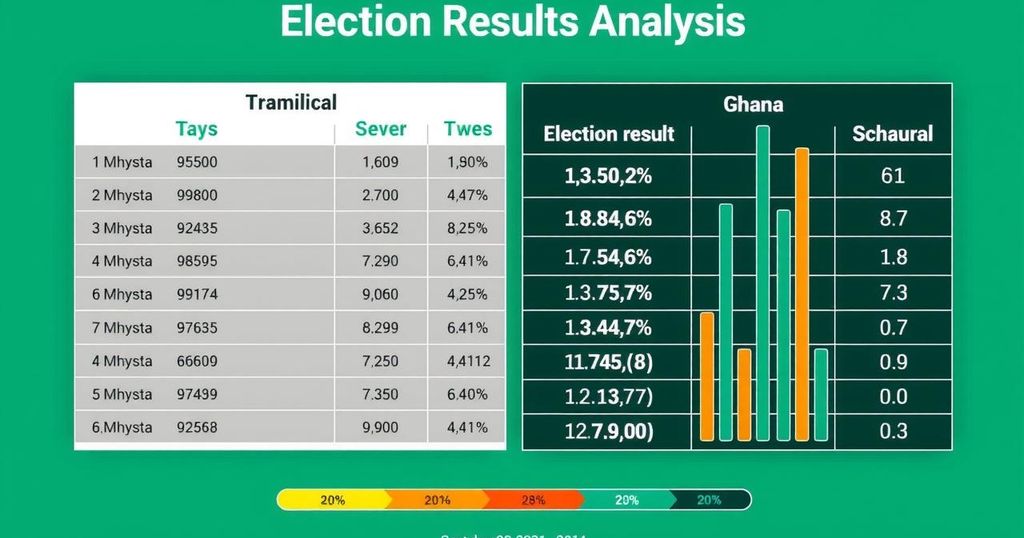Ghana’s 2024 Elections: NPP’s Defeat and the Rise of the NDC
Ghana’s 2024 elections resulted in the ruling New Patriotic Party (NPP) losing to the National Democratic Congress (NDC) led by John Mahama. Voter discontent over economic hardships, high inflation, and unemployment significantly influenced the electoral outcome. The NPP’s failure to address these issues, alongside accusations of corruption, led to a substantial loss of parliamentary seats and a shift in the political landscape, reflecting a broader trend of opposition victories across Africa amidst economic turmoil.
In the 2024 elections, the New Patriotic Party (NPP), led by President Nana Akufo-Addo and Vice President Dr. Mahamudu Bawumia, suffered a notable defeat against the National Democratic Congress (NDC) under John Mahama. Ghanaians voted to remove the ruling government that had been in power for eight years, a term limit upheld since the advent of this democratic republic in 1992. The NPP had aimed to create history by breaking this tradition, but widespread discontent over economic hardships, stemming from inflation and rising unemployment, led to widespread voter disillusionment. Political analysts like Mussa Dankwah noted that the ruling party’s handling of the economy significantly influenced voters’ decisions, with surveys indicating a lack of support amidst an economic crisis marked by a 54% inflation rate as recorded in 2023.
Despite the NPP’s attempts to bolster their campaign with promises of free senior high school education and digitalization initiatives, many citizens expressed concerns over their ability to afford basic necessities. The government’s tax policies, including a COVID-19 levy and an electronic transfer levy, further frustrated the populace, particularly among youth who continue to grapple with high unemployment rates recorded at 14.7%. In stark contrast, the NDC capitalized on these grievances, portraying themselves as champions of the people’s needs, which culminated in significant electoral victories in key regions.
Moreover, the ruling party’s inability to address issues such as corruption and mismanagement of public funds aggravated public sentiment. Allegations of poor contracts and controversial projects, including the highly criticized national cathedral initiative, increased voter skepticism. The outcome of the parliamentary elections mirrored the presidential results, as the NPP lost numerous seats, including high-profile ministerial seats, leading to a drastic shift in the political landscape. In a broader context, Ghana’s electoral results reflect a larger trend in African politics in 2024, where ruling parties across the continent have faced significant defeats amid pressing economic crises and public demand for accountability from their governments.
The backdrop to Ghana’s 2024 elections is characterized by a political climate marked by consistent criticism of the ruling New Patriotic Party (NPP)’s governance amid significant economic challenges. Following eight years in power, the NPP aimed to extend its tenure, focusing on accomplishments like free education. However, economic downturns, such as unprecedented inflation and rising unemployment, eroded public confidence. This dissatisfaction and growing unrest became acute as Ghanaians faced hardships, influencing electoral outcomes. Moreover, the notion of favorability in leadership, coupled with a desire for change, resonated strongly among voters, steering them toward the opposition National Democratic Congress (NDC), and signaling a pivotal moment in Ghana’s political dynamics.
In conclusion, the 2024 elections in Ghana marked a significant political shift as the NPP, led by Nana Akufo-Addo and Dr. Bawumia, succumbed to the NDC under John Mahama. The ruling party’s loss was predominantly attributed to public dissatisfaction stemming from an economic crisis characterized by alarming inflation rates and increasing unemployment. Voter sentiment was heavily influenced by the government’s inability to address pressing economic issues and allegations of corruption. As Ghana reflects this pattern of political turnover seen across Africa, the implications of this election extend beyond immediate governance, indicating a public demand for accountability and transparency in leadership.
Original Source: www.bbc.com




Post Comment